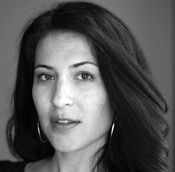Both poetry and horse racing still give us a ticket to ride, a little bit of chance in our pockets. A little rally, rally, rally.
By **Ada Limón**
 “Is this your first Derby?” asked an industry notable at the Media Party for the 137th Kentucky Derby in Louisville. I nodded, “Yes,” and dumb-smiled at a room full of horse-racing penmans and personalities. It was my first Kentucky Derby. Or rather my first time in eleven years watching it outside of Brooklyn, on the TV screen of any given dive bar. My best friends, all of us writers, used to sit around after placing our bets at the now defunct Greenpoint OTB on Manhattan Avenue, and wish hard for a winner. Sometimes we actually won, which was good, because we needed the money. But more than the money, we needed to win something. With a garbage bag full of rejection letters and no significant promising career, everything, it seemed, came down to one thing: luck.
“Is this your first Derby?” asked an industry notable at the Media Party for the 137th Kentucky Derby in Louisville. I nodded, “Yes,” and dumb-smiled at a room full of horse-racing penmans and personalities. It was my first Kentucky Derby. Or rather my first time in eleven years watching it outside of Brooklyn, on the TV screen of any given dive bar. My best friends, all of us writers, used to sit around after placing our bets at the now defunct Greenpoint OTB on Manhattan Avenue, and wish hard for a winner. Sometimes we actually won, which was good, because we needed the money. But more than the money, we needed to win something. With a garbage bag full of rejection letters and no significant promising career, everything, it seemed, came down to one thing: luck.
At the OTB we’d stand in the corner, the few girls among the serious and seasoned old-timers who never looked away from the screen long enough to even notice our rare race-day trespass, and make some last minute wagers. Once, we saw a post-it note stuck to the betting window that said, “$10 on #3,” and all three of us bet $10 on the horse #3 without even thinking about it. Like good writers, and bad bettors, we took everything to be a sign. And by moving to New York, as newbie artists, we all felt we had the kinship of, well, having bet on ourselves. We wanted to be poets, playwrights, and reporters. We also wanted to win the big trifecta: money, love, and fame. I’ll take this life and double it, seemed to be the functioning motto.
[W]e all like the idea of unpredictable possibility, of betting on a sport where anything can happen.
The motto still guides us to some degree as we continue to work as full-time writers, with all the scuffle and stiff-upper lip it requires. And as luck would have it, with my boyfriend who is a horse-racing reporter, I landed a spot on his arm at the most exciting two minutes in sports. In Louisville it’s all Derby all the time, and far different from the well-worn OTBs that New York City shut down six months ago. Even the waitress at the local chain restaurant was wearing a pin that said, “Talk Derby to Me.” It reminded me of the buttons given out by the Academy of American Poets during the Association of Writers & Writing Programs Conference (essentially the writer’s Kentucky Derby, with only 1 percent of the money, and 110 percent of booze), that said, “Is that a Poem in Your Pocket?“
There’s a kinship between the two worlds of poetry and racing. Both are historic, respected, storied, and somewhat antiquated forms of entertainment. Racing is called the Sport of Kings. Poetry is called, “Wait, People Still Do That?” These are the longshots of entertainment. Poetry doesn’t have the big hats, it doesn’t have the outfits, or the money, but it does have a sense of tradition that sometimes feels threatened in the age of the quick, the immediate, and the new. Though perhaps not the typical favorites in the current race of popular culture, both poetry and horse racing still give us a ticket to ride, a little bit of chance in our pockets. A little rally, rally, rally.
Race day at Churchill Downs was beyond anything I could have imagined. From fine-silk-suited men to cigar-sucking frat boys, women high up on heels and college girls sunk deep in the afternoon drink, the loud energetic crowd was both grotesque and gorgeous. But behind-the-scenes; where the horses, jockeys, trainers, and owners, quietly prepared for racing’s biggest show, there was such a sense of thick anticipation it was shiver-worthy. Someone’s whole life could change. And it did. Animal Kingdom, a horse with an unfashionable pedigree and who probably should have been longer than his 20-1 odds, took down the lion’s share of the $2 million purse.
I didn’t win any money on the Kentucky Derby this year, though I’m happy a longshot won the run for the roses. And it seems that the Sport of Kings might have won as well, as a record 164,868 people showed up at Churchill Downs to see 19 horses run a mile and a quarter. That’s more people than attended the Super Bowl this year, and more than the World Cup. Perhaps that proves that we all like the idea of unpredictable possibility, of betting on a sport where anything can happen, of banking on luck when the race is wide open.
Copyright 2011 Ada Limón
________________________________________________________________________
Ada Limón grew up in Glen Ellen and Sonoma, California. Her work has appeared in The New Yorker, Harvard Review, and Poetry Daily. She is the author of three books of poetry, Lucky Wreck, This Big Fake World, and Sharks in the Rivers.
…
|
|
|||||||
|
|




